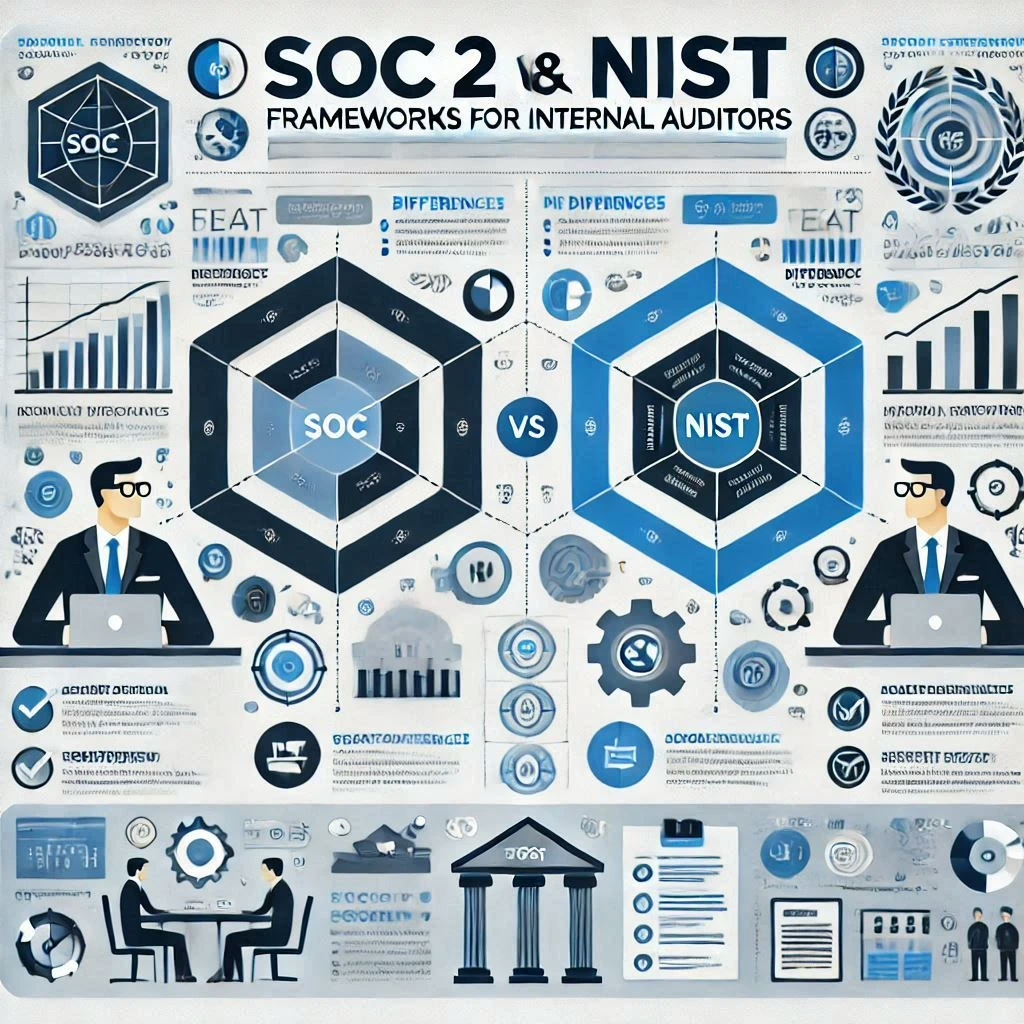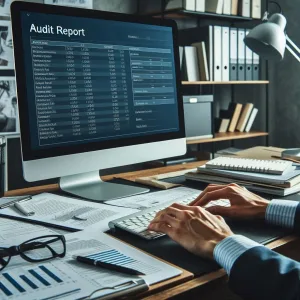Introduction to RPA and Its Impact on Internal Audit
Robotic Process Automation (RPA) is a technology that enables the automation of repetitive and labor-intensive tasks across various business functions. By utilizing software robots or “bots,” RPA can perform tasks such as data entry, data reconciliation, and report generation with minimal human intervention. This technology is particularly beneficial in areas like finance, accounting, technology, legal, human resources, and increasingly, audit and compliance. The core functionalities of RPA include:
- Automation of Routine Tasks: RPA can handle repetitive tasks that typically consume significant time and resources, allowing organizations to streamline operations and reduce human error.
- Data Management: RPA can efficiently manage and process large volumes of data, ensuring accuracy and consistency in data handling.
- Integration with Existing Systems: RPA can work across various applications and systems without the need for extensive changes to existing infrastructure, making it a cost-effective solution for many organizations [1][2].
The adoption of RPA is rapidly growing across various industries, driven by the need for efficiency and innovation. According to Gartner, the global revenue generated by RPA software is projected to reach $2.9 billion in 2022, highlighting the increasing reliance on this technology to enhance operational capabilities [7]. Organizations are recognizing the potential of RPA to not only improve productivity but also to address challenges such as the shortage of financial auditors and the demand for more innovative auditing practices [12].
In the context of internal audit, the implications of RPA are profound. The integration of RPA into audit practices allows for:
- Enhanced Audit Efficiency: By automating routine audit tasks, auditors can focus on higher-value activities such as data analysis, risk assessment, and strategic decision-making. This shift not only improves the efficiency of the audit process but also enhances the overall quality of audits [9][12].
- Continuous Auditing Capabilities: RPA enables internal audit teams to transition from traditional periodic audits to continuous auditing, allowing for real-time monitoring and quicker identification of anomalies or exceptions in data [8][9].
- New Testing Approaches: As RPA changes the landscape of business processes, internal audit departments will need to adopt new methodologies for testing automated processes, ensuring that controls are effectively embedded within the automated workflows [2][3][4].
Tthe rise of RPA presents both opportunities and challenges for internal auditors. As the technology continues to evolve, auditors must develop new skills and adapt their practices to leverage the benefits of RPA effectively. Understanding the core functionalities of RPA, its growing adoption across industries, and its implications for audit practices will be crucial for auditors aiming to thrive in this new era.
The Evolving Role of Internal Auditors
As organizations increasingly adopt Robotic Process Automation (RPA), the role of internal auditors is undergoing a significant transformation. This shift from traditional auditing practices to a more technology-focused approach necessitates the development of new skills and responsibilities for auditors. Here are some key points to consider:
Shift to Tech-Focused Auditing: The integration of RPA into business processes means that auditors must now understand not only the processes themselves but also the underlying technologies that drive them. This includes familiarity with automation tools, data analytics, and the ability to assess the effectiveness of automated controls. Auditors are moving from a purely compliance-focused role to one that requires a deeper understanding of technology and its implications for risk management and operational efficiency [2][14].
New Responsibilities: In the RPA era, auditors will face several new responsibilities, including:
- Evaluating Automation Risks: Auditors must assess the risks associated with automated processes, including potential errors in bot programming and the implications of system failures. This requires a keen understanding of both the technology and the business processes it supports [15].
- Continuous Monitoring: With RPA enabling real-time data processing, auditors will need to implement continuous monitoring strategies to ensure that automated processes are functioning as intended and that any anomalies are promptly addressed [14].
- Collaboration with IT: Auditors will increasingly collaborate with IT departments to ensure that automation initiatives align with organizational goals and compliance requirements. This collaboration is essential for understanding the technical aspects of RPA and for integrating audit functions into the automation lifecycle [12][15].
Adapting to Technological Change: The rapid pace of technological advancement means that auditors must be proactive in updating their skills and knowledge. This includes:
- Ongoing Education: Auditors should engage in continuous professional development to stay abreast of emerging technologies and trends in RPA. This may involve formal training programs, workshops, and certifications focused on automation and data analytics [3][14].
- Embracing a Growth Mindset: As the landscape of internal auditing evolves, auditors must adopt a growth mindset, being open to learning and adapting to new tools and methodologies. This adaptability will be crucial for effectively navigating the complexities introduced by RPA [5][15].
The advent of RPA is reshaping the internal audit profession, requiring auditors to embrace new technologies and responsibilities. By developing the necessary skills and adapting to this changing environment, internal auditors can enhance their value to organizations and ensure effective oversight in the age of automation.
Essential Skills for Auditors in the RPA Era
As the landscape of internal auditing evolves with the integration of Robotic Process Automation (RPA), auditors must adapt by acquiring new skills that align with these technological advancements. Here are the essential skills that auditors need to enhance or develop to thrive in the RPA era:
- Data Analysis: In an environment increasingly driven by data, auditors must possess strong data interpretation and analysis skills. This includes the ability to analyze large datasets to identify trends, anomalies, and insights that can inform audit decisions. Proficiency in data analytics tools will enable auditors to leverage data effectively, enhancing the quality and efficiency of audits [3][11].
- Understanding RPA Technologies: Familiarity with RPA tools and platforms is crucial for auditors. This knowledge allows them to understand how automation impacts audit processes and the overall business environment. Auditors should be well-versed in the functionalities of various RPA solutions to assess their implications on internal controls and compliance [10].
- Process Mapping: The ability to visualize and document automated processes is essential. Auditors need to create clear process maps that outline how RPA is implemented within the organization. This skill helps in identifying potential gaps in controls and ensuring that automated processes align with audit objectives [9][10].
- Risk Assessment: Auditors must develop skills to evaluate the risks associated with automated processes. This includes understanding the unique risks that RPA introduces, such as dependency on technology, data integrity issues, and potential operational disruptions. Effective risk assessment will enable auditors to provide valuable insights into the risk landscape of automated environments [10][11].
- Communication Skills: Enhancing collaboration with IT and other departments is vital in the RPA era. Auditors must possess strong communication skills to effectively engage with technical teams, understand the implications of automation, and convey audit findings clearly. This collaboration is essential for ensuring that audit recommendations are actionable and aligned with organizational goals [12].
As RPA continues to transform the auditing profession, internal auditors must focus on developing these essential skills. By doing so, they will not only enhance their effectiveness but also contribute to the overall success of their organizations in navigating the complexities of automated processes.
Training and Development Opportunities
As organizations increasingly adopt Robotic Process Automation (RPA) within their internal audit functions, the skill set required for auditors is evolving significantly. To thrive in this new landscape, auditors must focus on enhancing their capabilities in RPA and data analytics. Here are some key points to consider regarding training and development opportunities for internal auditors:
Relevant Courses and Certifications
- Auditors should seek out specialized courses that cover RPA fundamentals, data analytics, and their application in auditing. These courses often provide insights into managing, configuring, and troubleshooting RPA systems, which are essential skills in the automated auditing environment [2].
- Certifications such as Certified Information Systems Auditor (CISA) and Certified Data Analyst (CDA) are particularly relevant as they focus on emerging technologies in auditing, equipping auditors with the necessary knowledge to navigate the complexities of RPA [11].
Role of Professional Organizations
- Professional organizations play a crucial role in providing training resources for internal auditors. They often host conferences, workshops, and webinars that focus on critical issues related to RPA and fraud detection, helping auditors stay ahead of industry trends [5].
- These organizations also curate a variety of training materials and resources that can be accessed by members, ensuring that auditors have the latest information and tools at their disposal to enhance their skills.
Encouragement for Participation in Workshops and Webinars
- Engaging in workshops and webinars is highly beneficial for auditors looking to gain hands-on experience with RPA tools and techniques. These interactive sessions allow participants to apply their knowledge in real-world scenarios, fostering a deeper understanding of how RPA can be integrated into auditing processes [10].
- Additionally, these events often feature industry experts who share insights and best practices, providing auditors with valuable networking opportunities and the chance to learn from peers [5][10].
As the auditing landscape transforms with the integration of RPA, it is imperative for internal auditors and professional development trainers to prioritize skill enhancement through targeted courses, certifications, and active participation in professional organizations and events. By doing so, they can ensure they remain effective and relevant in their roles, ultimately contributing to the success of their organizations in the RPA era.
Challenges and Considerations in the RPA Adoption
As organizations increasingly adopt Robotic Process Automation (RPA) to enhance efficiency and accuracy, internal auditors must navigate a new landscape filled with unique challenges and considerations. Here are some key points that highlight the hurdles auditors face, the ethical implications of automation, and the necessity for ongoing learning and adaptability.
Common Challenges Auditors Face When Adapting to RPA
- Integration Issues: One of the primary challenges is the integration of RPA into existing systems. Organizations often face high costs and difficulties in merging RPA with their current processes, which can lead to operational disruptions and inefficiencies if not managed properly [5].
- Skill Gaps: Auditors must develop new competencies to effectively audit RPA implementations. This includes acquiring skills in predictive analytics, IT audit techniques, and understanding the complexities of automated processes. A lack of these skills can hinder auditors’ ability to assess RPA controls adequately [2].
- Process Complexity: The complexity of processes that RPA automates can pose significant challenges. Auditors need to evaluate whether existing processes are suitable for automation and identify any necessary changes to make them RPA-eligible [7]. This requires a deep understanding of both the technology and the underlying business processes.
- Governance and Control: Ensuring proper governance and control mechanisms are in place is crucial. Auditors must assess the risks associated with RPA, including potential control deficiencies and the need for robust audit trails to maintain accountability [11][9].
Importance of Ethical Considerations in Automation
The adoption of RPA raises new ethical considerations that auditors must navigate. Key ethical challenges include:
- Maintaining Independence and Objectivity: As auditors increasingly rely on automated tools, they must ensure that their independence and objectivity are not compromised. This includes being vigilant about potential biases in automated decision-making processes [12].
- Confidentiality and Data Security: With RPA handling sensitive data, auditors must ensure that adequate controls are in place to protect confidentiality and prevent data breaches. This requires a strong understanding of data governance and security protocols [12].
- Navigating Moral Challenges: The use of advanced technologies in auditing introduces moral dilemmas that auditors must address with integrity. This includes making decisions that align with ethical standards while leveraging automation to enhance audit effectiveness [12].
Need for Continuous Learning and Adaptability
In the rapidly evolving landscape of RPA, continuous learning and adaptability are essential for internal auditors. Key aspects include:
- Ongoing Professional Development: Auditors should engage in continuous education to stay updated on emerging technologies and their implications for auditing practices. This includes attending workshops, obtaining certifications, and participating in relevant training programs [4].
- Embracing a Growth Mindset: Adopting a mindset that values flexibility and openness to change is crucial. Auditors must be willing to rethink their roles and embrace new technologies as they emerge, ensuring they remain relevant and effective in their positions [4][10].
- Collaboration and Knowledge Sharing: Internal auditors should foster a culture of collaboration and knowledge sharing within their organizations. By working together and sharing insights on RPA challenges and solutions, auditors can enhance their collective understanding and improve audit outcomes.
While the adoption of RPA presents significant challenges for internal auditors, it also offers opportunities for growth and innovation. By addressing these challenges, prioritizing ethical considerations, and committing to continuous learning, auditors can effectively navigate the RPA landscape and enhance their contributions to their organizations.
Future Trends in Internal Audit and RPA
As the landscape of internal auditing continues to evolve, the integration of Robotic Process Automation (RPA) is set to redefine traditional auditing practices. Here are some key predictions and insights into how RPA will shape the future of internal audit:
- Evolution of Auditing Practices: The adoption of RPA is expected to streamline and enhance auditing processes significantly. By automating repetitive tasks such as data collection and analysis, auditors can focus on more strategic activities that add value to the organization. This shift will necessitate a transformation in the skill sets of auditors, who will need to adapt to new technologies and methodologies to remain effective in their roles. The ability to leverage RPA will allow auditors to conduct more thorough and timely audits, ultimately improving the quality of insights provided to stakeholders [1][10].
- Integration of AI and Machine Learning: The future of auditing will likely see a deeper integration of AI and machine learning alongside RPA. These technologies can analyze vast amounts of data, identify patterns, and predict potential risks, which are essential capabilities for modern auditors. As auditors become more proficient in data science and analytics, they will be better equipped to interpret complex datasets and derive actionable insights. This evolution will require ongoing training and development to ensure that auditors possess the necessary skills to utilize these advanced technologies effectively [5][7][8].
- Importance of Human Oversight: Despite the advancements in automation, the role of human oversight will remain crucial in the auditing process. Automated systems, while efficient, can still produce errors or overlook nuanced issues that a human auditor might catch. Therefore, auditors will need to develop skills in critical thinking and judgment to complement the capabilities of RPA and AI. The balance between automation and human intervention will be vital to ensure that audits are not only efficient but also accurate and reliable [10][15].
The relationship between internal audit and RPA is poised for significant transformation. As auditors embrace new technologies, they will need to cultivate a diverse skill set that includes technical proficiency, analytical capabilities, and critical oversight. This evolution will not only enhance the effectiveness of internal audits but also position auditors as strategic partners in their organizations, capable of navigating the complexities of a rapidly changing business environment.
Conclusion
As the landscape of internal auditing evolves with the integration of Robotic Process Automation (RPA), it is imperative for auditors to adapt and enhance their skill sets to remain effective in their roles. The shift towards RPA not only transforms traditional auditing practices but also necessitates a new approach to skill development. Here are the key takeaways:
- Adapting to RPA Advancements: The internal audit function is experiencing dynamic changes due to RPA, which requires auditors to develop competencies in areas such as data analysis, data visualization, and data governance. These skills are essential for auditors to effectively navigate the complexities introduced by automation and to leverage technology for enhanced audit processes [12][13].
- Proactive Training and Development: Auditors should take the initiative to seek out training opportunities that focus on the latest technological advancements and methodologies in auditing. Continuous learning is crucial for staying at the forefront of industry changes and ensuring that auditors can effectively utilize RPA tools to improve audit efficiency and effectiveness [8].
- Organizational Support: It is vital for organizations to recognize the importance of supporting their auditors during this transition. By providing resources for training and development, organizations can empower their audit teams to embrace RPA and other technological innovations, ultimately leading to more robust and insightful audit outcomes [7][8].
In conclusion, the era of RPA presents both challenges and opportunities for internal auditors. By proactively developing new skills and fostering a culture of continuous learning, auditors can not only enhance their professional capabilities but also contribute significantly to their organizations’ success in navigating the digital age.
Find out more about Shaun Stoltz https://www.shaunstoltz.com/about/
This post was written by an AI and reviewed/edited by a human.



